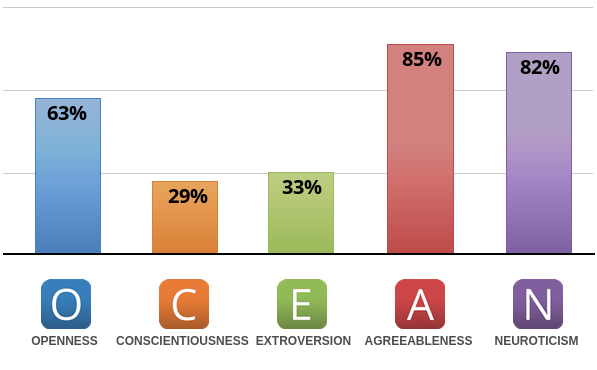Big Five Personality Test
You are here because one of your friends linked you to their Big Five Personality result:
Take the TestYour friend's Big Five scores are:
Explanation of Traits
Openness
High: Imaginative, intellectual, artistic, seeks adventure, thinks in symbols and abstractions.
Low: Practical, realistic, factual, sensible, down-to-earth, prefers familiarity and routine.
Your Friend's Score: Average
Conscientiousness
High: Organized, reliable, self-controlled, orderly, cautious, disciplined, strong sense of duty.
Low: Disorganized, spur-of-the-moment, impulsive, procrastinating, finds rules constraining.
Your Friend's Score: Low
Extroversion
High: Extroverted, outgoing, gregarious, enthusiastic, action-oriented, excitable, social.
Low: Introverted, reserved, low-key, quiet, disengaged, deliberate, needs time alone.
Your Friend's Score: Low
Agreeableness
High: Considerate, altruistic, friendly, generous, sympathetic, modest, trusting, helpful.
Low: Critical, confident, self-interested, skeptical, stubborn, unfriendly, uncooperative.
Your Friend's Score: Very High
Neuroticism
High: Anxious, fearful, tense, nervous, self-conscious, susceptible to anger and depression.
Low: Serene, calm, stable, composed, tranquil, poised, unfazed, few intense emotions.
Your Friend's Score: Very High
Statistics
Political Orientation
Though correlations between personality and political opinions are modest, your friend is statistically most likely to be politically Left-wing. (Source: Iyer et al. 2012)
Gender
Based on your friend's personality scores, your friend is statistically more likely to be Female than Male. (Source: Vecchione et al. 2012; Mondak 2010)
Personality Type
According to John A. Johnston, professor of psychology at Pennsylvania State University, your friend's Big Five scores suggest that your friend is a(n)... (WARNING: Not all of Dr. Johnston's descriptions are positive. Expand at your own risk.)
Personality Type
According to studies by Gerber and associates (Yale University), Raso and associates (Stanford), and others, your friend's scores indicate that he or she is:
- Likely to consume more societal and political (as opposed to entertainment or case-based) news reporting than the general population.
- Likely to have more of an interest in politics and to be more knowledgeable about politics than the general population.
- Likely to get more of their political information from the internet, as opposed to from radio and TV.
- Likely to be more interested in following political debates directly, as opposed to “after action” commentaries and reports.
- Less likely than the general population to be a member of any political party.
- Likely to watch a greater ratio of national (as opposed to local) news than the general population.
- Less likely than the general population to let their commitment be guided by the issues that are likely to yield concrete personal payoffs in their life (as opposed to abstract ideological ones).
- More likely than the general population to watch and enjoy late-night satire that ridicules politics and politicians.
- More likely to keep informed on politics because they feel it is fun or exciting than because they feel it is a type of obligation or social duty.
- Likely to take more risks with their health, diet, and lifestyle than the general population.
- Likely to spend less time than the general population striving for career achievements, devoting themselves to hobbies and extra-professional activities as well.
- Likely to waste more time procrastinating with internet games, social media etc. than the general population.
- Less likely than the general population to attend political campaign events and meetings.
- Less likely than the general population to voice support for their political views by writing to elected officials or for the opinion pages of newspapers and magazines.
- More likely than the general population to stay constant in their level of political engagement (i.e. as opposed to mostly following politics in conjunction with elections, etc.).
- Likely to spend less time reading newspapers than the general population.
- Less likely to watch political talk shows than the general population.
- More likely than the general population to sign political petitions when asked to do so by friends.
- More likely than the general population to vote in elections.
- Less likely than the general population to speak out in favor of either side when attending political debates.
- More likely than the general population to take a strong pro-environmentalist stands (i.e. windmills, recycling, taxes on industry, ban on fracking, etc.).
- Likely to be more sincere and straightforward in their approach to political dealings than the general population (i.e. not glossing over the downsides to their views; not tailoring the truth to their audience, etc.).
- Likely to care more than the general population about what the politicians they vote for are like as human beings (their personalities; what their interpersonal dealings are like; whether they behave pro-socially, etc.).
- More likely than the general population to donate money to their preferred political candidate or party.
- Less likely than the general population to work as a volunteer for a national political party.
- More likely than the general population in their country to take a negative view of immigration to their country.
- Less likely than the general population to be satisfied with their preferred political candidate's performance while in office.
References
The calculations in this test were conducted on the basis of data discerned from the following studies:
- Gerber, A.S., Huber, G.A., Doherty, D., Dowling, C.M.: Personality Traits and the Consumption of Political Information American Politics Research 39(1), 2010
- Gerber, A.S., Huber, G.A., Doherty, D., Dowling, C.M., Raso, C., Ha, S.E.: Personality Traits and Participation in Political Processes Journal of Politics, Volume 73, Issue 03, July 2011
- Gerber, A.S., Huber, G.A., Doherty, D., Dowling, C.M.: Personality and the Strength and Direction of Partisan Identification Political Behavior 34, 2012
- Iyer R., Koleva S., Graham J., Ditto P., Haidt J.: Understanding Libertarian Morality PLoS ONE 7(8), 2012
- Mondak, J.J.: Personality and the Foundations of Political Behavior Cambridge University Press, 2010
- Vecchione, M., Alessandri, G., Barbaranelli, C., Caprara, G.: Gender Differences in the Big Five Personality Development Personality and Individual Differences, Volume 53, Issue 6, October 2012
Take Next
GET THE FULL STORY
Become a lifetime member with a one-time payment
WHAT YOU GET
Access to members-only tests
Ability to track and save test results
Access to all of our eBooks (value $44.94)
Access to premium type assessments and infographics
Become a memberSave and monitor your results over time
Become a member today
Sign Up












